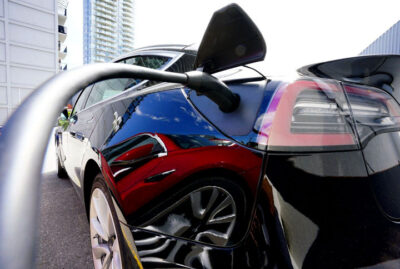2035 zero-emissions vehicle mandate sparking concerns
By Lethbridge Herald on January 5, 2024.

Al Beeber – LETHBRIDGE HERALD – abeeber@lethbridgeherald.com
A federal mandate calling for all vehicles sold in Canada by 2035 to be zero-emission has sparked concerns in Alberta.
The provincial government, the Alberta Motor Dealers Association and Lethbridge MP Rachael Thomas all have issues with the mandate that was issued by the Liberal government in December.
In a scathing attack, Premier Danielle Smith last month said “in another show of total disregard for the well-being of Canadians, the federal government has unilaterally imposed an unconstitutional edict with a bizarrely impossible timeline that will result in massive increases in the cost of vehicles and utility bills, vehicle rationing and wait lists, increased costs to businesses and elevated difficulty and safety risk for hundreds of thousands of Albertans and Canadians just trying to get to work and family activities in our unpredictable, and often cold, climate.
“The sheer hypocrisy of this announcement is astounding. To date, the federal government’s EV approach has been a disaster. The independent federal commissioner of the environment and sustainable development found Ottawa is failing to meet its current target of making 80 per cent of the federal government’s fleet vehicles net zero by 2030. The federal commissioner found that if progress continues at the current rate, the federal government will reach only one per cent of its target by 2030. Not only are there not enough electric vehicle chargers, Ottawa doesn’t even know where EV chargers are needed,” said the Premier.
On Friday, Thomas shared the Alberta premier’s contempt for the plan in a statement to The Herald.
“The Liberal’s out-of-touch intent to force Canadians into EVs is ridiculously out of touch with reality. It’s completely unrealistic. Electric vehicle aren’t viable in many parts of Canada, let alone Lethbridge and the surrounding rural areas. Most importantly, this direction will result in massive new costs for consumers and prevent lower-income Canadians from being able to afford a car at all. The last thing Canadians need is government policy that will make their life even more expensive,“ said the MP.
Gerald Wood, president of the AMDA, in a phone interview from Edmonton Friday said while members are excited about the product coming on-stream from automakers, “the timeline is incredibly tight” for the mandate to be implemented
Several issues exist around the timeline including what’s commonly called range anxiety. Electric vehicles can only run so long on a charge and the range can be impacted by cold weather when it’s been estimated they will lose 25-30 per cent of their range.
And with existing technology, towing limitations combined with the range of existing batteries is also problematic for both recreational and commercial applications.
While there is no plan yet, Wood expects however that the government could put in a “little wiggle room” in its rules for commercial applications down the road.
“It’s an interesting dilemma that we find ourselves in,” said Wood.
“We all know that oil and gas is very critical to this province. We also know that the federal government is trying to move away from that.”
The dealers have to try to figure out to deal with the situation, he added.
“The product is coming and our dealers are excited about it because quite frankly in a lot of ways, it’s really good product. People will enjoy driving it. However, the climate that we deal with here, at least in today’s world, presents some very real challenges when it comes to cold weather and those types of things,” said Wood.
The biggest worry for the AMDA is “what’s it going to take the charging infrastructure to a point where consumers will be more comfortable about making the transition to electric vehicles,” Wood said.
“There’s no question that the rural markets are going to have a significantly tougher job and the reality here in Alberta is we have a tendency not to think really hard about jumping in the car and driving for four or five hours. And with an electric vehicle, that’s going to require a charge at some point that we’ve got to incorporate into our lives,” he said.
One thing that needs to be considered is that while there may be enough charging infrastructure today to accommodate people on their travels if they’re willing to stop and recharge, when a car park is 100 times as big as it is today “the fact of the matter is there just simply are not enough charging stations to accommodate that and that’s really been our message to the federal government – look, we hear what you’re trying to do, we firmly believe that this really needs to be a consumer-led adoption.’”
Some manufacturers have begun reducing their investment in EVs “because the fact of the matter right now, we’re starting to see some inventory on dealers’ lots because the demand just simply isn’t there,” added Wood.
A lot of that inventory is due to range anxiety with people not sure electrics will meet their needs.
“I happen to believe the technology will evolve – there’s some incredibly intelligent people working on all that” which will make some of those issues disappear, said Wood, but instituting a timeline that says everyone must be buying EVs by 2035 “it becomes somewhat daunting for sure.”
A key point for the association is the amount of range that is lost in winter because there is a significant population in Alberta who drive the same long distances in colder months as they do in warmer months, Wood added.
“It’s one thing to say ‘we’ll put charging stations in to accommodate that but the reality is the cost benefit is a lot tougher if you’re having to charge twice as often in the winter as you do in the summer.”
He said driving an electric takes a different mindset because people have to plan to park for up to 40 minutes on a trip to charge.
“It will definitely take a mindset change the way people travel.”
For urban drivers, who have home charging systems, an electric may be fine but Wood said the province doesn’t have a solution for people who live in multi-family dwellings or apartment complexes.
“We’re even starting to hear that it’s becoming more and more difficult for those apartment buildings to get insurance because if there happens to be a fire – we’ve seen a few news reports recently if one of these batteries has an issue and there’s a fire, it’s very difficult to get them out. So we’ve actually heard of some apartment buildings not even allowing you to even park your car in a parkade, let alone put a charging station in it. That’s a whole other kettle of fish” if suddenly 100-200 charging stations are needed in a parkade, he added.
“The power requirement in order to accommodate that would be fairly significant.”
A lot of unanswered questions exist between now and 2035 when Ottawa expects dealers to stop selling internal combustion engines, he added.
In her statement, Smith said “although it seems rather obvious to say, emissions targets and regulations must be realistic, achievable, and cannot result in multiple severe harms to millions of Canadians.”
The Premier also noted that electrical grids aren’t equipped to handle the demand surge that a full-scale transition to EVs would need.
““There is a way to encourage Canadians to drive more EVs, hydrogen-powered cars and other low-emission vehicles. Instead of telling Canadians how to spend their money and lining up for the right to purchase what they need, the federal government should focus on helping provinces develop infrastructure and advance technologies that are more suitable to Canada’s long distances and cold weather,” the Premier’s statement said.
33-32




The bottom line is that the Conservatives want the planet to die.
It’s in their ‘holy scriptures’
This article is a bit confusing, and maybe the author or the editor could have clarified with a few sentences about the actual mandate…since this is a pretty contentious and important issue. The article seems to suggest that this Zero-Emission Vehicle mandate calls for dealers to “stop selling internal combustion engines”, and that cars sold after 2035 will only be EVs that you have to charge. I thought plug-in hybrids were still going to be sold. So I went looking on the federal government website, which is also very confusing, and maybe found the problem. The mandate calls for all vehicles to be “zero emission” by 2035, but then confusingly includes plugin-hybrids with an all-electric range greater than 80km as “zero emission”. To be clear, a PHEV *does have* an internal combustion engine. I just checked some websites and found that there are versions of popular vehicles for sale right now (e.g. Ford Escape, Toyota RAV4) that are PHEVs with an all-electric range of almost (but not quite) 80km, but these vehicles also drive with gas engines and have total range of hundreds of kms. I’ve never driven one of these things, but I think when the gas runs out, you just fill it up at a regular gas station and keep driving. I’m certainly no fan of government mandates, but at least let’s be clear about what this one says.
Interesting to hear outright lies from my Conservative MP, i.e. “Electric vehicles aren’t viable in many parts of Canada, let alone Lethbridge and the surrounding rural areas.”
As an electric vehicle owner for the past 13 years, living and working in Lethbridge and the surrounding rural areas, I know this is not true. One has to wonder at the motivations for our local MP to spread this kind of disinformation.
I can tell you that driving hybrids and then full electric vehicles throughout the surrounding rural areas makes travel a lot cheaper, a savings that prompted me to make the change to electric vehicles 13 years ago. I’ve found no reason to switch back since.
We just drove down to Writing On Stone provincial park for the day from Lethbridge. I needed no gas and didn’t have to make any charging stops. (There is a charging station in Milk River if you should need one.)
Rachael Thomas thinks you should fear EVs. There’s a better chance you will love them.
Yeh and you should be charged the road tax through your insurance seeing as you are bragging about no gas. You’re skipping out on the backs of others. Also think you should pay 16.00 a tire recycle tax seeing as that overweight tank you drive uses approx twice the number of tires as an ICE. Virtue signally at best. Look at me!!!
There is reality and wet dreams..EV may work for a few urban people but RURAL is not going to be easy when 40 minute charging time is required and its 100-150 miles one way and minus 40 deg most of this is bad news as we are already short of power even in the summer.This all has to be run back and seriously considered as its not a pokaman game.Politicians are endangering lives not enough common sense prevails here yet.
Actually, EVs would work for most urban people – that is, 95% of the population in car-dependent nations. Over half of car trips are under 3 miles, over 99% under 100 miles. (https://insideevs.com/news/585399/majority-daily-car-trips-less-three-miles/)
If we can’t figure out how to manage the 1% of trips (where EVs are not yet capable) to reduce overall emissions to net-zero, then Lumpy’s Rule prevails. Doing nothing to reduce emissions does not mean everything will stay the same.